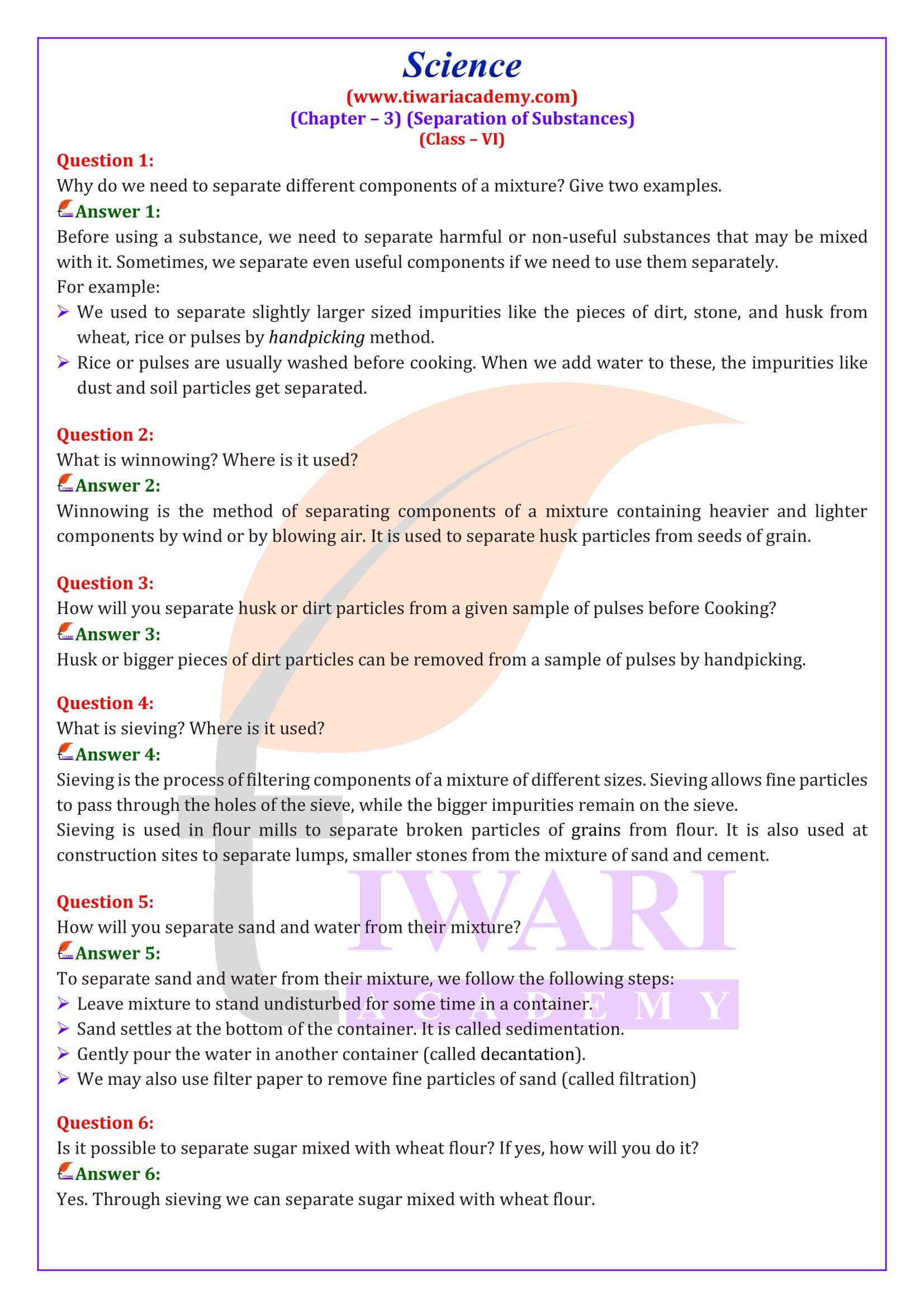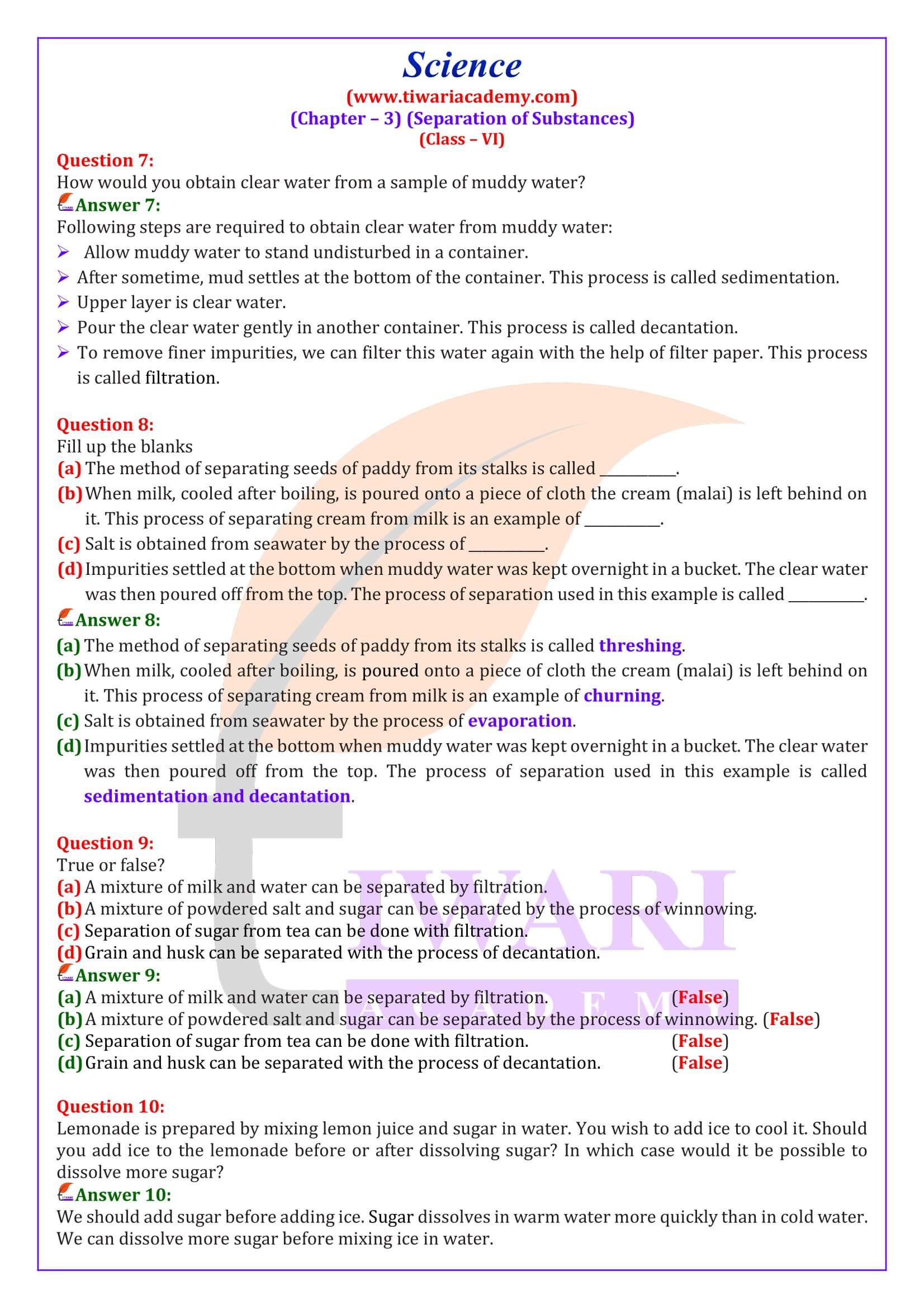NCERT Solutions for Class 6 Science Chapter 3 Separation of Substances in English and Hindi Medium prepared for CBSE session 2024-25. Class 6th Science chapter 3 question answers are revised according to new syllabus and latest textbooks published for academic year 2024-25.
NCERT Solutions for Class 6 Science Chapter 3
Class VI Science chapter 3 solutions in Videos are also available for session 2024-25. These solutions are based on latest NCERT Books and Class 6 Science Offline Apps for offline use.
| Class: 6 | Science |
| Chapter 3: | Separation of Substances |
| Content: | NCERT Exercise Solutions |
| Content Mode: | Online Text and Videos |
| Academic Session: | CBSE 2024-25 |
| Medium: | Hindi and English Medium |
Important Questions for Practice
1. In an activity, a teacher dissolved a small amount of solid copper sulphate in a tumbler half filled with water. Which method would you use to get back solid copper sulphate from the solution?
(a) Decantation (b) Evaporation (c) Sedimentation (d) Condensation
2. Boojho’s grandmother is suffering from diabetes. Her doctor advised her to take ‘Lassi’ with less fat content. Which of the following methods would be most appropriate for Boojho to prepare it?
(a) Filtration (b) Decantation (c) Churning (d) Winnowing
3. Paheli asked for a glass of water from Boojho. He gave her a glass of ice cold water. Paheli observed some water droplets on the outer surface of the glass and asked Boojho how these droplets of water were formed? Which of the following should be Boojho’s answer?
(a) Evaporation of water from the glass.
(b) Water that seeped out from the glass.
(c) Evaporation of atmospheric water vapour.
(d) Condensation of atmospheric water vapour.
4. Four mixtures are given below
(i) Kidney beans and chick peas
(ii) Pulses and rice
(iii) Rice flakes and corn
(iv) Potato wafers and biscuits
5. Which of these can be separated by the method of winnowing?
(a) (i) and (ii) (b) (ii) and (iii) (c) (i) and (iii) (d) (iii) and (iv)
Which of the following mixtures would you be able to separate using the method of filtration?
(a) Oil in water (b) Cornflakes in milk (c) Salt in water (d) Sugar in milk
6. During summer, Boojho carries water in a transparent plastic bottle to his school. One day he left his bottle in the school. The bottle still had some water left in it. The following day, he observed some water droplets on the inner surface of the empty portion of the bottle. These droplets of water were formed due to
(a) boiling and condensation.
(b) evaporation and saturation.
(c) evaporation and condensation.
(d) condensation and saturation.
Important Questions on Class 6 Science Chapter 3
Why do we need to separate different components of a mixture?
Before using a substance, we need to separate harmful or non-useful substances that may be mixed with it. Sometimes, we separate even useful components if we need to use them separately. For example: We used to separate slightly larger sized impurities like the pieces of dirt, stone, and husk from wheat, rice or pulses by handpicking method. Rice or pulses are usually washed before cooking. When we add water to these, the impurities like dust and soil particles get separated.
How will you separate husk or dirt particles from a given sample of pulses before Cooking?
Husk or bigger pieces of dirt particles can be removed from a sample of pulses by handpicking.
What is sieving? Where is it used?
Sieving is the process of filtering components of a mixture of different sizes. Sieving allows fine particles to pass through the holes of the sieve, while the bigger impurities remain on the sieve. Sieving is used in flour mills to separate broken particles of grains from flour. It is also used at construction sites to separate lumps, smaller stones from the mixture of sand and cement.
Fill up the blank: The method of separating seeds of paddy from its stalks is called ___________.
The method of separating seeds of paddy from its stalks is called threshing.
Fill up the blank: Salt is obtained from seawater by the process of ___________.
Salt is obtained from seawater by the process of evaporation.
Answers of Important Questions
1 (b),
2 (c),
3 (d),
4 (d),
5 (b),
6 (c).




